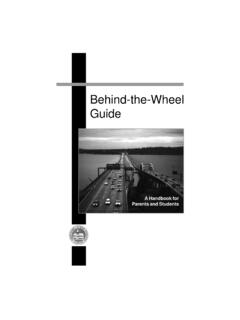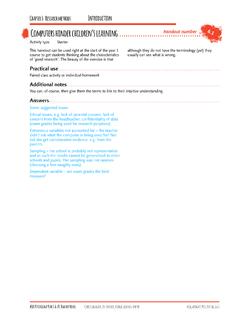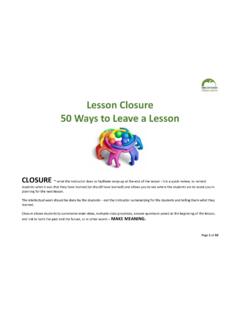Transcription of English Idioms with Examples - Bloomsbury International
1 English Idioms with Examples Learn the meaning and origin of 20 common English Idioms . Quiz included. 1 Why Learn Idioms ? An idiom is a phrase that has a meaning which is different from the meanings of each individual word in it. For example , if someone says to you I m pulling your leg , you might think it is strange because you would definitely be able to feel if someone was holding your leg and pulling it! This idiom actually means that they are teasing you or playing a joke on you. There are hundreds of common English Idioms in the English language which we use every day. In fact, most English people do not even realise they are using them! As the meanings are usually completely different to the meanings of the actual words, it can be very difficult to learn them you need to learn them in the same way you learn new vocabulary. One of the most difficult aspects of learning English or any foreign language for that matter is how to learn Idioms .
2 Idioms are words or phrases whose meaning can t be worked out from literally translating the words themselves. Therefore, learning Idioms can be really quite difficult, as there are no shortcuts or patterns you can use to help you remember them. Of course, you could always decide that you don t need to worry about Idioms after all, it s possible to get your point across in English without using idiomatic expressions. However, failing to learn Idioms will mean that you don t always understand everything you hear or read. It will also mean you miss out on the true colour and personality of the English language and British culture. If you can master a range of English Idioms , you ll become a more comfortable and natural English speaker, who is able to chew the fat with native English speakers that you meet. So, while there are no quick fixes to learning idiomatic expressions, here s a starter for ten of things you can do to help make remembering them a piece of cake: Use your diary It s always a good idea to keep a vocabulary diary while you re learning English in London, as it gives you the chance to note down words or expressions you hear but don t understand.
3 So if you hear, read or see an expression or phrase, and you can t work out its meaning from the words 2 themselves, the chances are that it s an idiom. Note it down and take it to your next lesson, so you can ask your tutor what it means. Use context While you can t work out the meaning of an idiom by translating the words in the phrase, sometimes the context can give you clues to help you work it out. For example , if someone is talking about a day out that went wrong, if they say something like it just added insult to injury, you could use the context of hearing about the problems and issues of the day to work out that this idiom refers to making the situation worse. Use the Idioms you ve learned If you think you ve mastered the meaning of an idiom and the correct context in which to use it, then don t be shy! If you see an opportunity, then use it, whether in conversation or in writing. It can be nerve-wracking to use a phrase you re not used to, especially if you re not completely certain whether you re using it correctly, but biting the bullet and doing it is the only way to really learn its usage.
4 A Catch-22 Situation Meaning A frustrating situation in which someone is trapped by contradictory rules. Often this is a situation in which the rules and regulations actually stop a problem from being solved. For example , a homeless person needs to find a job so that they can afford somewhere to live, but they cannot apply for a job because they have nowhere to live this is a Catch-22 situation. Origin Catch-22 comes from the title of Joseph Heller's 1961 novel. In the story, Catch-22 was a rule followed by army doctors in The Second World War. If a frightened pilot tried to avoid a dangerous mission 3 by claiming he was insane , this was seen as healthy and the doctor would diagnose him as sane and eligible to fly. In contrast, any pilot who actually wanted to fly was marked as insane and would not be allowed to do so. So Catch 22 was the perfect example of an illogical rule which made everyone unhappy. After the release of a film based on the book in 1970, the phrase a Catch-22 situation or a Catch-22 fix became widely used to mean a paradoxical problem.
5 Examples The Sunday Times: Catch-22 Property Crisis: Young people don t have enough money to get on the property ladder, but banks will only lend money to property-owners. Rob: I ve been looking everywhere for a job, but no-one will give me an interview because I don t have any work experience. Rachel: It s a Catch-22 situation until someone offers you a job, you won t be able to get any experience. Hannah: I ve found myself in a real Catch-22 fix if I go back to work I can hardly make enough money to pay for childcare, but if I stay at home to look after the baby I can hardly make enough money to pay for food and rent either way, I m struggling to survive financially. Bring Home the Bacon Meaning To earn a living/earn enough money to live on and provide for yourself or your family. Origin The idiom bringing home the bacon started in the 1100s in a small town in Essex. The legend goes that the vicar of the church of Dunmow would reward the couple that hadn t argued for a whole year and a day with a side of bacon.
6 The winners were considered to be role models for the community and the competition was designed to create harmony in the family unit. However, there are others who believe that the idiom started in the 1500s. In those days one of the most fascinating fairground attractions was to try and catch a greased pig with your bare hands, and whoever managed to do so would be able to 4 take the prized animal home. So, if you won you would literally be bringing home the bacon. But where does the connection to money come from? Well, if you consider that in both stories you had to earn your prize and that money was probably short at the time, it would be fair to say that the side of bacon represented a cash prize of sorts. Examples This is ridiculous! I work all hours under the sun and I still can t seem to bring home the bacon. My husband stays home and looks after the children, and I bring home the bacon. I always tell my children to follow their passions, but that bringing home the bacon is also important.
7 Cold Feet Meaning To become nervous or frightened to do something you had planned to do. Origin The exact origin of this idiom is unknown; however, many people believe that it is a military phrase. If a soldier became too scared to go into battle, he would complain that his feet were frozen as a way to avoid fighting or to enter the battle slowly. Examples Jason was just about to bungee jump from that bridge but he got cold feet and didn t do it. They asked me to sing at the concert last night but I couldn t. After seeing how many people were in the audience I got cold feet. Sally: Are you looking forward to your wedding tomorrow? Anita: Of course. I m a bit worried about Jack though. He s been acting strange recently and I m worried he ll get cold feet and not turn up at the church! 5 Sally: Don t be silly, Jack loves you. I m sure he ll be there. Cool as a Cucumber Meaning Extremely calm, relaxed and in control of your emotions. Origin This phrase may have originated from the fact that even in hot weather, the inside of cucumbers are approximately 20 degrees cooler than the outside air.
8 Therefore, a person who stays cool, calm and relaxed in a difficult situation can be compared to a cucumber staying cool inside, even in hot weather! Examples I know that Tom was really nervous before his bungee jump but he looked as cool as a cucumber. I don t understand how you can stay cool as a cucumber when you give presentations to more than 100 people. I get so nervous and I always mix up my words. Rob: When is your job interview? Sue: Tomorrow. I m so nervous! Rob: Don t worry. Just act as cool as a cucumber and tell them you re the best person for the job. You ll be fine! Don t Count your Chickens Before they Hatch Meaning You shouldn t assume that something will definitely happen before it really does. Don t make plans based on predicted results that haven t occurred yet. This phrase is often shortened to Don t count your chickens. Origin A hen (female chicken) lays eggs from which young chickens (chicks) hatch or emerge. However, not all eggs successfully produce a chicken, so you shouldn t count the eggs and assume that each one will produce a chick you should wait to count the actual chickens until they have hatched.
9 6 This phrase may have its origins with Aesop, the Greek fable writer who lived around 620 to 560 BC. In his fable The Milkmaid and Her Pail , a milkmaid carries a pail (bucket) of milk on her head and daydreams about selling the milk, buying chickens with the money and then becoming so rich from selling the eggs that she becomes independent. She will then have enough money to shake her head to say no to all the young men trying to win her love. However, in the fable she is so immersed in this daydream that she shakes her head and accidentally drops the milk, therefore destroying the possibility of her dream by imagining it too soon. There is a line from the fable which reads Ah, my child, said the mother, Do not count your chickens before they are hatched. Examples Mary: I m sure my boss will give me a raise next month, so I ve decided to treat myself to an exotic holiday. Dennis: If I were you I wouldn t book the holiday until you actually get the t count your The current Prime Minister seems pretty confident that his party will win the general election in May and get re-elected.
10 However, he shouldn t count his chickens until they hatch. Harry: When Liverpool wins the FA Cup, I m going to have a huge party! Beth: Don t count your chickens before they hatch! They haven t even played the semi-finals yet! Eat my Hat Meaning People say I ll eat my hat when they are sure something will not happen. Origin No-one would want to literally eat their hat so this expression is only used when someone is very sure about something. One of the earliest appearances of this phrase was in Charles Dickens The Pickwick Papers in 1837: If I knew as little of life as that, I'd eat my hat and swallow the buckle whole . There are many things that would be very difficult to eat so it is not known why a hat was chosen. However, some people think that it is because the king and his companions used to wear large and elaborate hats that would have been especially difficult to eat! 7 Examples He's always late. If he gets here on time, I ll eat my hat!











